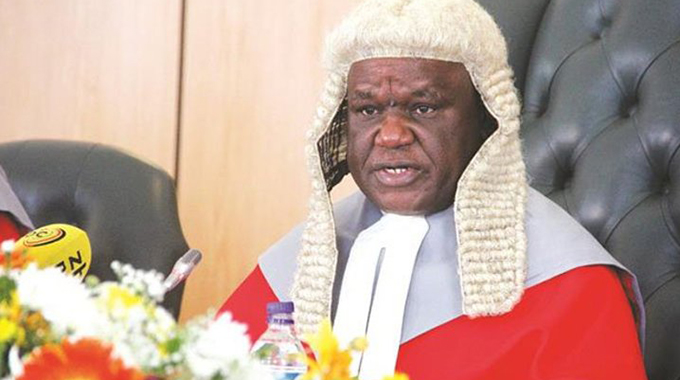Rights groups hail caning ruling

Daniel Nemukuyu Senior Court Reporter
THE recent outlawing of judicial corporal punishment has been hailed by human rights and legal experts as a major milestone pointing to Zimbabwe’s efforts to meet its international and regional commitments. Chief Justice Luke Malaba sitting with eight other judges of the Constitutional Court, struck down Section 353 of the Criminal Procedure and Evidence Act, which provided for moderate corporal punishment for juvenile offenders.
The landmark judgment was made in a case in which a 15-year-old boy was contesting the constitutionality of the six strokes imposed on him for raping a 14-year-old girl.
Social workers and legal experts said the decision was overdue considering that Zimbabwe had signed a number of international treaties outlawing corporal punishment.
Save the Children communications and advocacy advisor Ms Sophie Hamandishe said Zimbabwe had made strides in protecting the rights of the children.
“The judgment is a major milestone which points to the Government’s efforts to meet its international and regional commitments, notably the United Nations Convention on the Rights of the Child (UNCRC) and African Charter on the Rights and Welfare of the Child (ACRWC).
“In particular, Article 37 of the UNCRC which states that no child shall be subjected to torture or other cruel, inhumane or degrading treatment or punishment.
“Save the Children applauds the Government of Zimbabwe and in particular, the Constitutional Court, for outlawing the administration of corporal punishment against juvenile offenders with effect from 3 April, 2019.
“As a child rights organisation, we view this as a progressive step towards the creation of a child friendly justice delivery system, that takes full cognisance of the rights of children in conflict with the law in Zimbabwe,” said Ms Hamandishe.
Mrs Ratidzo Moyo of Childline Zimbabwe applauded the court for the judgment.
“We believe the recent decision of the court is a step in the right direction for child protection in Zimbabwe. As a country we need to protect our children,” she said.
“The ruling is in sync with the country’s new Constitution. Cases of domestic violence and public violence are being taken seriously. Whenever they occurred the matter would be reported to the police for the law to take its course.
“However, corporal punishment had remained part of the justice system despite the fact that it was a form of violence being perpetrated on the young ones.”
Chief Justice Malaba, in the 72-page judgment, urged the courts to impose sentences that are rehabilitative to minors.
“The courts have to play a new role in the promotion and development of a new culture in juvenile sentencing, founded on the recognition of human rights enshrined in the Constitution.
“Sentencing policies have to be influenced by both the Constitution and international law,” he said.
The outlawing of corporal punishment, Chief Justice Malaba said, should push Government into action and establish more training institutions for the rehabilitation of juvenile offenders.
“The abolition of judicial corporal punishment should give new impetus to the establishment of more training institutions in the country.
“Formal rehabilitation programmes such as vocational training for juvenile offenders need to be intensified and expanded to contribute towards the reintegration of juvenile offenders into the community,” he said.
Chief Justice Malaba said more probation officers should be trained to ensure execution of an effective juvenile justice system.
“There is need for training of more probation officers. Rule 16.1 of the Beijing Rules requires that before a court renders a final disposition prior to sentencing a juvenile offender, the background and circumstances in which the juvenile is living or the conditions under which the offence has been committed shall be properly investigated to facilitate judicious adjudication of the case by the court.
“Social reports are an indispensable aid in legal proceedings involving juveniles,” he said.
The Judiciary head said the courts had a duty to impose sentences that are rehabilitative to minor offenders.
Save the Children, which had been partnering with the Child Rights Coalition of Zimbabwe and Justice for Children Trust in advocating for the prohibition of corporal punishment in all settings, urged the Government to ensure strict enforcement of the judgement.
Zimbabwe National Council for the Welfare of Children (ZNCWC) director, Reverend Taylor Nyanhete welcomed the decision saying although the judgment was on judicial corporal punishment, it followed that children should not be beaten up at home and even at school.
“If there is no more caning in the judicial setting, it follows that no one should be allowed to inflict violence on a child in any form.
“Although the judgment deals with caning in the justice setting, I believe the Constitution does not allow any form of violence on a child, be it at school or even at home,” he said.
Rev Nyanhete said it was now time for child rights organisations to embark on campaigns to raise awareness on alternative ways of disciplining children.
“There are many alternative ways of disciplining children without caning them. Society has to be educated on alternative ways of disciplining the children.
“We, as an organisation, are now working on awareness campaigns and chances are high that we will get support to promote alternative ways of disciplining children,” he said.








Comments